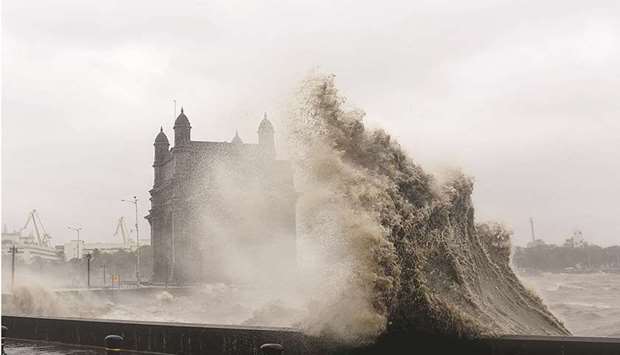A deadly cyclone blasted ashore in western India late yesterday with fierce winds and drenching rains that turned streets into rivers, disrupting the country’s response to its devastating Covid-19 outbreak.
Cyclone Tauktae, which local press reports called the biggest to hit the area in 30 years, has unleashed heavy weather since the weekend that killed at least 20 people in its approach to land.
It made landfall in Gujarat just after 8.30pm local time as an extremely severe cyclonic storm packing winds of 155-165km per hour, gusting up to 185kph, the Indian Meteorological Department said.
One woman died after high winds knocked over an electricity poll in the city of Patan in northern Gujarat, officials said.
Sea levels swelled as high as 10 feet along the coast, said local weather officials in the coastal town of Diu, which reported wind speeds of 133kph.
The colossal swirling system visible from space has exacerbated India’s embattled response to a coronavirus surge that is killing at least 4,000 people daily and pushing hospitals to their breaking point.
In waterlogged and windswept Mumbai, where authorities on Monday closed the airport and urged people to stay indoors, authorities shifted 580 Covid patients “to safer locations” from three field hospitals.
Six people died and nine were injured as the storm lashed Maharashtrae, of which Mumbai is the capital, the chief minister’s office said.
Two navy ships were deployed to assist in search and rescue operations for a barge carrying 273 people “adrift” off Mumbai’s coast, with 28 picked up so far, the defence ministry said late yesterday.
Seven people died and nearly 1,500 houses were damaged in Kerala state, Chief Minister Pinarayi Vijayan tweeted late yesterday.
Around 200,000 people were evacuated in Gujarat, where all Covid-19 patients in hospitals within 5kms of the coast were also moved.
Authorities there scrambled to ensure there would be no power cuts in the nearly 400 designated Covid hospitals and 41 oxygen plants in 12 coastal districts.
Chief Minister Vijay Rupani told reporters that over 1,000 Covid hospitals in coastal towns have been provided with generators and power backups, with 744 health teams deployed along with 174 ICUs on wheels and 600 ambulances.
“Besides the daily requirement of 1,000 tonnes of oxygen in Gujarat per day, an additional stock of 1,700 tonnes has been secured and could be used in case of emergency,” Rupani said.
Virus safety protocols such as wearing masks, social distancing and the use of sanitisers would be observed in the shelters for evacuees, officials added.
The state also suspended vaccinations for two days.
Mumbai did the same for one day.
Thousands of disaster response personnel have been deployed, while units from the coast guard, navy, army and air force have been placed on standby.
Maharashtra evacuated around 12,500 people from coastal areas.
Four people died on Saturday as rain and winds battered Karnataka state, while two died in Goa as winds hit power supplies and uprooted trees.

Waves lash the coastline following cyclone Tauktae at the Gateway of India in Mumbai yesterday.
